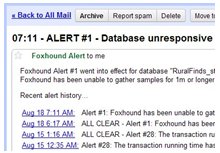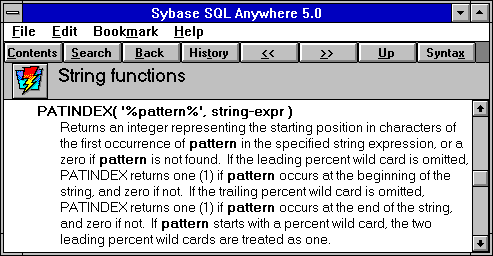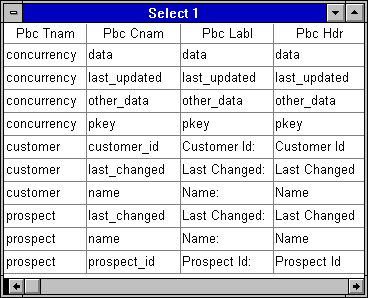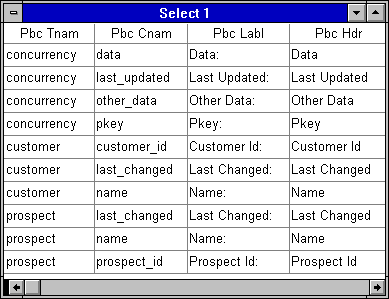

|
Foxhound is the better* Database Monitor for SQL Anywhere.
*better: More thorough, more relevant, more effective.
...more Alerts, more All Clears, more details, more control in your hands.
|
Breck Carter
Last modified: July 15, 1996
mail to: bcarter@bcarter.com
[Home]
How can I write a SQL update command to find and modify search strings embedded within character columns?
If you're using SQL Anywhere 5 you can use the new PatIndex function:

The pattern parameter isn't restricted to ordinary characters surrounded by percent signs. It can be something like
PatIndex ( '%[_][a-z0-9]%', company_name )
to find a single underscore followed by a lowercase character or digit.
Here are some of the rules for building fancy patterns:
_ Matches any one character.
% Matches a string of zero or more characters.
[string] Matches any single character in 'string'.
The 'string' can contain ranges like a-z
which matches any character from a to z.
[^string] Matches any single character not in 'string'.
The ^ must appear as the first character
inside the brackets to have this effect.
[x] Matches a single character 'x' which can
be one of _ % [ ] ^. In other words,
'[_]' and '_' work differently.
[x-] Matches either 'x' or '-'.
[x%] Matches either 'x' or '%'.
[x^] Matches either 'x' or '^'.
It is a peculiarity of PatIndex that the pattern '%string%' returns the position of 'string' within the search target. In other words, the surrounding '%' characters are treated differently from any '%' characters that might be embedded within the 'string' pattern itself.
Here's an example of how valuable and powerful PatIndex is: Repairing
the PowerBuilder Extended Catalog tables. Incorrect use of a product
like ERwin can sometimes cause the PBCATCOL label and header values to
contain the raw column names themselves. For example, "last_updated"
shows up instead of "Last Updated:":

The PatIndex function can be combined with the new "SQL Batch" facility to write a series of commands that regenerate the PBCATCOL label and header values from scratch:
/* PBC_FIX.SQL - Regenerate PBCATCOL Labels and Headers */
/* Before running this from the Database Painter, change */
/* Preferences - Database - TerminatorCharacter to something */
/* other than a semicolon. A backslash is used here. */
begin
declare not_done char ( 1 );
declare fix_count integer;
declare loop_count integer ;
/* Initialize the label and header to match the column name. */
update pbcatcol
set pbc_labl
= ucase ( left ( pbc_cnam, 1 ) )
+ substr ( pbc_cnam, 2 )
+ ':',
pbc_hdr
= ucase ( left ( pbc_cnam, 1 ) )
+ substr ( pbc_cnam, 2 );
/* Optional where clause to exclude labels and headers already filled in...
where ( ifnull ( pbc_labl, '', trim ( pbc_labl ) ) = '' ) AND
( ifnull ( pbc_hdr, '', trim ( pbc_hdr ) ) = '' ) ;
*/
/* Strip underscores and capitalize words in labels. */
set fix_count = (
select count(*)
from pbcatcol
where patindex ( '%[_][a-z0-9]%', pbc_labl ) > 0 ) ;
if fix_count > 0 then
set not_done = 'T';
else
set not_done = 'F';
end if;
set loop_count = 0; /* safety limit */
while not_done = 'T' loop
set loop_count = loop_count + 1;
update pbcatcol
set pbc_labl
= left ( pbc_labl,
patindex ( '%[_][a-z0-9]%', pbc_labl ) - 1 )
+ ' '
+ ucase ( substr ( pbc_labl,
patindex ( '%[_][a-z0-9]%', pbc_labl ) + 1,
1 ) )
+ substr ( pbc_labl,
patindex ( '%[_][a-z0-9]%', pbc_labl ) + 2 )
where locate ( pbc_labl, '_' ) > 0;
set fix_count = (
select count(*)
from pbcatcol
where patindex ( '%[_][a-z0-9]%', pbc_labl ) > 0 ) ;
if fix_count <= 0 then
set not_done = 'F';
end if;
if loop_count >= 20 then
set not_done = 'F'; /* let's stop now */
end if;
end loop;
/* Strip underscores and capitalize words in headers. */
set fix_count = (
select count(*)
from pbcatcol
where patindex ( '%[_][a-z0-9]%', pbc_hdr ) > 0 ) ;
if fix_count > 0 then
set not_done = 'T';
else
set not_done = 'F';
end if;
set loop_count = 0; /* safety limit */
while not_done = 'T' loop
set loop_count = loop_count + 1;
update pbcatcol
set pbc_hdr
= left ( pbc_hdr,
patindex ( '%[_][a-z0-9]%', pbc_hdr ) - 1 )
+ ' '
+ ucase ( substr ( pbc_hdr,
patindex ( '%[_][a-z0-9]%', pbc_hdr ) + 1,
1 ) )
+ substr ( pbc_hdr,
patindex ( '%[_][a-z0-9]%', pbc_hdr ) + 2 )
where locate ( pbc_hdr, '_' ) > 0;
set fix_count = (
select count(*)
from pbcatcol
where patindex ( '%[_][a-z0-9]%', pbc_hdr ) > 0 ) ;
if fix_count <= 0 then
set not_done = 'F';
end if;
if loop_count >= 20 then
set not_done = 'F'; /* let's stop now */
end if;
end loop;
end \
Here's what PBCATCOL looks like after the repairs:
